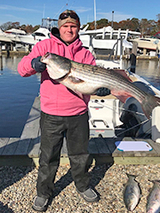Cardiac Tumor and Stroke: John's Story
Cardiac Tumor and Stroke: John's Story
As right tackle on the Brick Township High School’s varsity football team, 15-year-old John was used to pushing himself on the gridiron. But in October 2017, a frightening thing happened as he completed his warm-up exercises: He lost consciousness.

An ambulance rushed John to the closest hospital in Neptune, NJ, where doctors performed a brain scan and discovered the athletic sophomore had suffered a stroke. Thankfully, it didn’t appear he’d sustained any neurological damage. Doctors were concerned, however, that they couldn’t determine what had caused the interruption of blood flow to John’s brain. A cardiologist in New Jersey performed an echocardiogram and noted a finding on one of John’s heart valves.
After two days of testing and observation in New Jersey, John was transferred to Children’s Hospital of Philadelphia (CHOP) for further evaluation.
Finding the cause
At CHOP, John and his parents, Rob and Jeannie, met with neurologist Daniel Licht, MD, cardiologist Meryl Cohen, MD, and pediatric intensivist Jodi Chen, MD, who works in the Division of Cardiac Critical Care Medicine. The medical team reviewed the images from John’s brain scan and conducted further testing.
Within two hours they uncovered the cause of John’s stroke. He had a benign cardiac tumor, called a papillary fibroelastoma, on one of his heart valves. It was likely that a piece of the tumor had broken off and temporarily blocked the blood supply to a section of John’s brain, causing his stroke and loss of consciousness.
Doctors told John’s family that strokes caused by papillary fibroelastoma can lead to brain damage when pieces of the tumor break off in the heart and make their way to the blood vessels in the brain. Fortunately, in John’s case, the blockage didn’t last long or cause permanent brain damage.
However, John was still at grave risk. Because one piece of the tumor had broken off, there was a good chance that additional pieces would break off and cause a more serious stroke. The medical team decided they needed to act quickly to remove the tumor.
Cardiac surgery
The next morning — just three days after he’d passed out at football practice — John was prepped for open heart surgery. The procedure was performed by Christopher Mascio, MD, an attending cardiothoracic surgeon in CHOP’s Cardiac Center.
During surgery, Dr. Mascio removed what remained of the tumor and made sure no additional pieces remained in John’s heart.
Eight hours after surgery, John was up and walking. Three days later, he was released from the hospital. He didn’t need any medication or require any special care; his only limitation was to avoid exercise for eight weeks.
Within days of returning home, John says he felt better than he had before the operation. In the months before his stroke, John complained of frequent fatigue. After surgery, the fatigue was gone and as John healed, his strength and stamina improved.
At John’s four-week post-operative appointment, Dr. Licht performed extensive neurological tests on the teen. Results showed John had no sign of cognitive damage from the stroke.
Living an active lifestyle
Eight weeks after surgery, John’s medical team cleared him to return to his normal activities: weight lifting, Air Force Junior ROTC, and training for spring track where he throws shot put, discus and javelin. John has also resumed his activities in the gym. He wants to build strength and endurance so he’ll be in top form for summer football camp and his junior season.

In addition to his sports activities, John has a passion for history and is an avid fisherman. The family has a boat at the Jersey shore, and they enjoy deep sea fishing together.
John continues to see a local cardiologist for periodic follow-up examinations, and the doctor is in close communication with John’s medical team at CHOP.
Rob and Jeannie are grateful to CHOP for their expertise and kindness in treating John. “Without that fast diagnosis, he might not be here today,” says Rob.
“Everything at CHOP, from the surgeons, doctors and nurses to the parking and food was over-the-top excellent.”